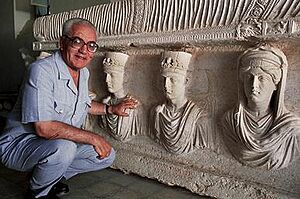Khaled al-Asaad facts for kids
Quick facts for kids
Khaled al-Asaad
|
|
|---|---|

Khaled al-Asaad in 2002
|
|
| Born |
Khaled Mohamad al-Asaad
1 January 1932 |
| Died | 18 August 2015 (aged 83) Palmyra, Syria
|
| Cause of death | Murder |
| Alma mater | Damascus University |
| Occupation | Archaeologist |
| Known for | Head of antiquities in Palmyra |
| Honours |
|
Khaled Mohamad al-Asaad (Arabic: خالد الأسعد, Arabic pronunciation: [ɐlʔæsʕæd], January 1932 – 18 August 2015) was a Syrian archaeologist. He was the head of ancient sites at the city of Palmyra, a UNESCO World Heritage Site. He worked in this important role for over forty years. Sadly, al-Asaad was killed by the Islamic State group on August 18, 2015. He was 83 years old.
Contents
Early Life and Family
Khaled al-Asaad was born in 1932 in Palmyra, Syria. He lived most of his life in this historic city. He studied history at Damascus University. Khaled had six sons and five daughters. One of his daughters was named Zenobia, after a famous ancient queen.
His Work as an Archaeologist
Protecting Ancient Palmyra
During his career, al-Asaad helped dig up and restore ancient Palmyra. He became the main person in charge of the Palmyra site in 1963. He held this important job for forty years. He worked with teams from America, Poland, Germany, France, and Switzerland. His biggest achievement was helping Palmyra become a World Heritage Site. This means it's a place of special importance to all of humanity.
Al-Asaad also spoke Aramaic fluently. He often translated ancient texts until 2011. From 1974 onwards, he organized exhibitions to show off Palmyra's old treasures. When he retired in 2003, his son Walid took over his work.
His Death and Legacy
The Fall of Palmyra
In May 2015, the modern city of Palmyra and its ancient ruins were taken over by the Islamic State group. Before this happened, al-Asaad helped move many valuable artifacts from the city museum to safety. However, he was captured by the terrorist group. The Islamic State group tried to make him tell them where the hidden artifacts were. He was killed in Palmyra on August 18, 2015, at the age of 83.
After al-Asaad's death, the Islamic State group listed reasons for his killing. They accused him of not following their beliefs. They also said he worked with "infidel conferences" and was "director of idolatry" in Palmyra.
Another person, Qassem Abdullah Yehya, who was a deputy director of laboratories, also protected the Palmyra site. He was also killed by the Islamic State group on August 12, 2015. He was 37 years old.
Global Reactions
Many people and organizations around the world were very sad and angry about al-Asaad's death.
- The Chief of Syrian Antiquities, Maamoun Abdulkarim, said al-Asaad was "a scholar who gave such memorable services to the place Palmyra and to history."
- Dario Franceschini, Italy's Minister of Cultural Heritage, announced that flags at all Italian museums would be lowered. This was done to honor al-Asaad.
- UNESCO and its director, Irina Bokova, strongly condemned his murder. They said, "They killed him because he would not betray his deep commitment to Palmyra."
- The United Kingdom and France also spoke out against the murder and the damage to Palmyra.
- A Persian-American poet, Kaveh Akbar, wrote a poem called "Palmyra" in response to al-Asaad's death.
Honors and Awards
Syrian Honors
- Order of Civil Merit (2015) - This award was given to him after his death.
International Honors
 Poland – Order of Merit of the Republic of Poland (1998)
Poland – Order of Merit of the Republic of Poland (1998) Italy – In 2015, a rehabilitated building in Pisa was renamed after al-Asaad to honor him.
Italy – In 2015, a rehabilitated building in Pisa was renamed after al-Asaad to honor him.
Film
- A 2019 film called Dam al Nakhl (Blood of the Palm Trees) tells the story of al-Asaad's brave stand against the Islamic State.
Images for kids
See Also
- Destruction of cultural heritage by ISIL
- Syrian Archaeological Heritage Under Threat
- Syro-Palestinian archaeology
- Virtual visit of Palmyra dedicated to Khaled al-Asaad


